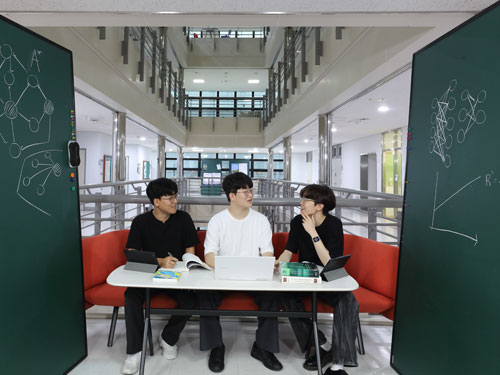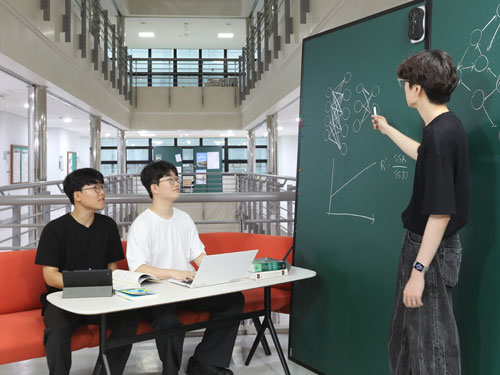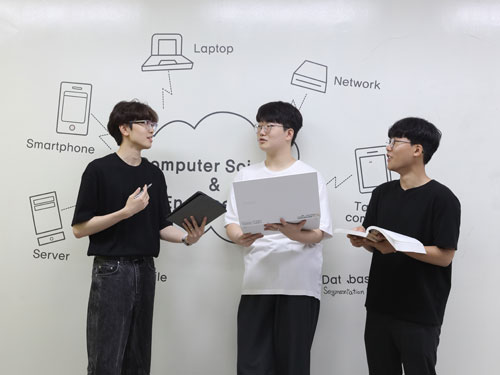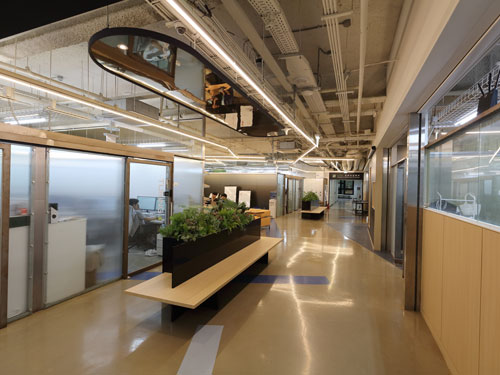- About
- Academics
-
Undergraduate Programs
- Civil and Environmental Engineering
- Architecture and Architectural Engineering
- Mechanical Engineering
- Industrial Engineering
- Energy Resources Engineering
- Nuclear Engineering
- Materials Science and Engineering
- Electrical and Computer Engineering
- Naval Architecture and Ocean Engineering
- Computer Science and Engineering
- Aerospace Engineering
- Chemical and Biological Engineering
-
Graduate Programs
- Civil and Environmental Engineering
- Architecture and Architectural Engineering
- Mechanical Engineering
- Industrial Engineering
- Energy Systems Engineering
- Materials Science and Engineering
- Electrical and Computer Engineering
- Naval Architecture and Ocean Engineering
- Computer Science and Engineering
- Chemical and Biological Engineering
- Aerospace Engineering
- Interdisciplinary Program in Technology, Management, Economics and Policy
- Interdisciplinary Program in Urban Design
- Interdisciplinary Program in Bioengineering
- Interdisciplinary Program in Artificial Intelligence
- Interdisciplinary Program in Intelligent Space and Aerospace Systems
- Chemical Convergence for Energy and Environment Major
- Multiscale Mechanics Design Major
- Hybrid Materials Major
- Double Major Program
- Open Programs
-
Undergraduate Programs
- Research
- Campus Life
- Communication
- Prospective Students
- International Office
- HOME
- Academics
- Undergraduate Programs
- Computer Science and Engineering
- Civil and Environmental Engineering
- Architecture and Architectural Engineering
- Mechanical Engineering
- Industrial Engineering
- Energy Resources Engineering
- Nuclear Engineering
- Materials Science and Engineering
- Electrical and Computer Engineering
- Naval Architecture and Ocean Engineering
- Computer Science and Engineering
- Aerospace Engineering
- Chemical and Biological Engineering
Computer Science and Engineering
 ChairLee, Jehee
ChairLee, Jehee Tel02-880-1526
Tel02-880-1526

Introduction
The study of computer science and engineering are now essential to success in the current information society. Researchers in this field study the design and production of high-performance computers, write operating system and application software, and apply these tools across the entire industry. This suggests that computer engineering is concerned not only with theory but also with applications to daily life. Thus, the development of computer engineering is important not only for the information industry but also for manufacturing and commerce across the entire nation.
The study of computer science and engineering demands logical reasoning and
original thinking based on engineering and scientific knowledge.
Computer software and hardware interact with each other. Thus, research and experiments examine specialized aspects of hardware and software, the structure of a computer, operating systems, databases, programming languages, computer communication, computer aided design , artificial intelligence, algorithms, natural language processing, multimedia systems, object-oriented systems, distributed systems, and real-time systems.
The computer industry integrates technology and human thought, and it is designated and supported as a national priority. However, the country lacks high-quality personnel in this field, and this is expected to be the case for some time. Because the scope of this field is expanding, the shortage is expected to become worse. To slow down and eventually end this trend, the Department of Computer Science and Engineering will research the development of new computer-related technologies in order to foster talented new computer engineers.
Research & Edu Streams
Algorithms and Information Security Stream
Research where Theory meets realityComputer Theory is the basic theory of computer science and has made a fundamental contribution to the development of computer science with efficient algorithm development, NP-completeness concept, and modern cryptology theory. Our research group basically studies efficient algorithm development. Particularly, we are doing research on Big data analysis algorithms, practical algorithms suitable for multicore and cache structures, and genetic algorithms, and also working on applications such as security and financial engineering.
Artificial Intelligence Stream
Computer that learns like humanAI(Artificial lntelligence) is one of the computer science fields that studies how to solve problems efficiently by simulating human recognition, thinking, memory, and learning.Currently, we are working on various theories and applied studies such as machine learning theory, computer vision, text mining, video analysis, recommendation agent, brain neural network analysis and ecosystem modeling
Computer Architecture and Embedded Systems Stream
Future controlled by Smart Embedded SystemIn the future, computing will not only be a PC on a desk, but will also provide convenience and safety in our lives, including smartphones, cars, aircraft, roads, buildings, and bridges. The core technology is to optimize and implement intelligent services for embedded computers with limited computing, memory and battery capacity. Embedded System Research Group conducts not only computer SW, but also CPU architecture, Memory Architecture, Memory architecture and multicore to optimize the system design considering the computer HW characteristics. These research will make possible of AI technology internalization to our lives.
Data Systems Stream
Research that extracts value from Big DataOur Research Group conducts research on Big Data, Databases, Data Mining, Machine Learning, and Deep Learning. Main Research subject is DBMS Support to improve Machine Learning performance, Data managing and saving technology for various Database application, Data Mining, Information Searching, Recommending System, Natural Language Processing, Deep Learning, Graph analysis such as Web/Social Network. Etc., Light weight and AutoML, Finance AI.
Graphics and Human-Centered Computing Stream
Human-Centered Visual Computing TechnologyComputer Graphics and HCI Technologies seek flawless communication between humans and computers. Many complex problems in modern society can find clue for the solution on proper visualization and human visual perception. Human-Centered Visual Computing Technology seeks to be a computer that is convenient for humans, to utilize human abilities in computing, and ultimately to cooperate with humans and computers. More specifically, research is conducted on shape modeling, multi-dimensional information visualization, image processing/ analysis, motion analysis and synthesis, interactive avatar control, intelligent virtual character, user interface design, and information visualization.
Network Systems Stream
The future internet will open the world of communication and exchangeResearch and Development of protocols and algorithms for all networks, including the internet, wireless networks, data center networks, and online social networks. Also recently researching about Internet security and privacy. More specifically, focusing on developing core technologies that will lead the future of telecommunication and internet services such as the architecture design of the Internet, the application of networking optimization of Artificial Intelligence technology, the development of network virtualization technology, the resource management of mobile / wireless communication, the development of IoT communication protocol and IoT system, the analysis of communication traffic, block chain, internet authentication, privacy protection technology.
Programming Principles and Tools Stream
Safe, Reliable, & Productive Programming Language and Software Engineering SystemThe current programming technology, even with all the hitherto thrilling advances, is still in infancy. The programming languages will constantly move to more convenient and higher levels. Programming tools will use more and more sophisticated logics and highly engineered implementations. Such tools will eventually reach to a point where ordinary programmers can daily use them without much effort. The cost of building secure and trustworthy software will be ever more decreased. We research on enabling technologies for such future: programming language theory, static analysis and verification, and software engineering applications and tools.
Quantum Computing Stream
A new paradigm for computingQuantum computing is a revolutionary computational method that utilizes the principles of quantum mechanics to process information in a different way than traditional computers. Quantum computers can perform many calculations at once, greatly increasing their processing power and enabling them to solve complex problems more efficiently than classical computers. They are used to study problems that are currently difficult to solve with classical computers, such as large-scale factorization, large-scale system optimization, and molecular structure simulation for drug discovery.
Systems Software Stream
Core Software System allows world-wide serviceFacebook, Instagram, Youtube, Kakao Talk. System software enables services to run faster, use less energy, and perform more reliably and safely from unexpected errors, intrusions and attacks on modern hardware. More in detail, including research as Hardware resource management of single system that managed by operating system technology, compiler and software platform technology that make it easy to develop various services, distributed/parallel system technology to solve the scalability problem with increasing number of users, Ariticial intelligence and big Research on data systems.



